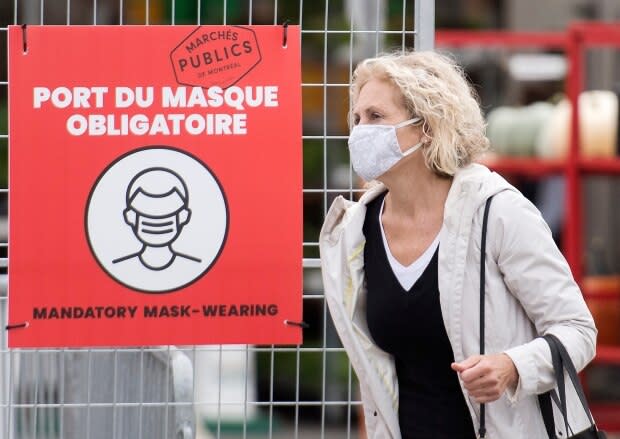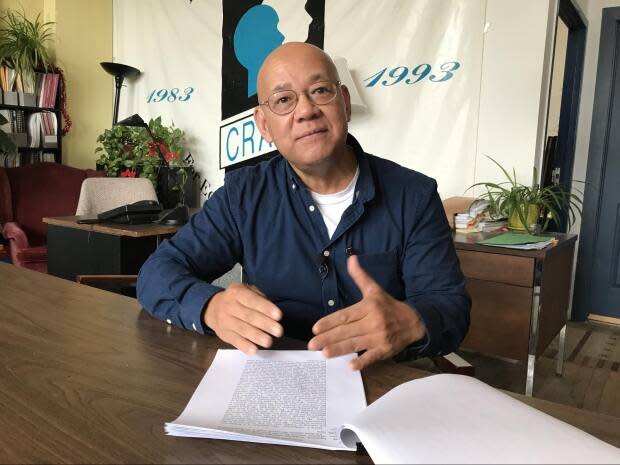Montreal advocates concerned new mask fines will target vulnerable communities
When the province started to see an uptick in cases earlier this month, the government announced it would crack down on those not following public health regulations by implementing hefty fines for not wearing a mask in indoor public spaces.
Deputy Premier Geneviève Guilbault repeated the importance of the fines in a news conference Friday.
"It's important to have repressive measures and it's important to have the means so that our police officers can give out tickets and fines, that they can intervene when people refuse to comply with public health measures," said Guilbeault.
Montreal Mayor Valérie Plante said that, while she does not want to see an increased police presence, it is a necessary step in controlling the pandemic.
"We don't like seeing police officers intervene in the public sphere or even private sphere," she said.
But, she said, the increased police presence in parks amid the first wave of COVID-19 worked.
Advocates working with Montreal's homeless population and other marginalized groups, do not share that point of view.
When the province began ticketing people for non-compliance with physical distancing regulations last summer, Jessica Quijano, co-ordinator at the Native Women's Shelter, said it created an extra layer of tension and trauma for Montreal's homeless community.
"[The police] ticketed enormously for [not] social distancing," said Quijano.
"We have an enormous amount of police ticketing and police violence downtown so I don't think we can leave that to the discretion of the police officers, especially when we have all of the problems of racial profiling."
Quijano is afraid those tensions will worsen now that police have another reason to issue fines.
Fines for not wearing a mask in indoor public spaces can range anywhere from $400 to $6,000 in Quebec.

And with the cold weather approaching, those living in the streets of Montreal will soon be relying on public indoor spaces, such as shopping malls and metro stations, for comfort and safety.
While the clients she works with would like to wear a mask and may understand the importance of public health regulations, Quijano says some just don't have that option.
Providing masks to vulnerable people
The Native Women's Shelter tries to distribute as many free masks as possible, but with funds short, they tend to run out, leaving many without a mask or the resources to buy one.
"It would just make so much more sense that, for example, when they're going to a mall, that the security guard were to just have some extra masks for someone who is homeless or struggling," said Quijano.
"Instead of just sending police and ticketing them an enormous amount that they're never going to be able to pay."

Instead of giving more power to the police, Quijano would like to see the government and city hire more intervention workers who could facilitate mask distribution and education in vulnerable communities.
"I think that most people would comply. I think there's very few people that are doing this intentionally. There are some, the anti-maskers, but that's not the majority of people," said Quijano.
Parallels with HIV/AIDS pandemic
Quijano said the current situation of policing is similar to what the city saw during the HIV/AIDS pandemic in the 1980s.
"The AIDS pandemic is a good example of criminalizing people with HIV — thinking that it would incite people to wear condoms and so forth — but we know that what works with people is prevention, education," said Quijano.
Quijano isn't the only one who drew a parallel with policing amid the HIV/AIDS pandemic.
In a report released by the Canadian Civil Liberties Association last June, research into government strategies during past pandemics, including HIV/AIDS, concluded that an educational approach was more effective in curbing the spread of infection than fines or criminal charges.
"There's a disproportionate impact on certain populations that are often already sort of marginalized or otherwise vulnerable," said Cara Zwibel, a lawyer and the director of the fundamental freedoms program at the Canadian Civil Liberties Association.
"It's just easier for some populations to comply with those rules than it is for others and so we do have concerns about how it will affect communities, but also whether it's effective in terms of achieving the public health goals that we want to achieve."
Concern for people of colour

Between Sept. 7 and 13, Montreal police issued only one fine for not wearing a mask on the metro, a spokesperson told CBC News earlier this week.
"Our officers prioritize an approach of public awareness and co-operation," the SPVM said in a statement.
"They will first ask the offender to comply with sanitary regulations."
Quebec City police also issued only one fine last weekend.
But Fo Niemi, director of the Center for Research-Action on Race Relations, does not believe all officers will have the same tolerant approach.
"We've never seen it happen like that," Niemi said.
"Despite the best intentions on the part of either the premier, the minister or even the police chief and police union, it's not going to work that way, on the ground, in some neighbourhoods."
Niemi said that, while this approach may work for some of the province's — largely white — outlying regions, he is concerned about the impact it could have on Black people and people of colour in Montreal.
"We know that police officers are known to be biased towards certain groups in society," he said.


